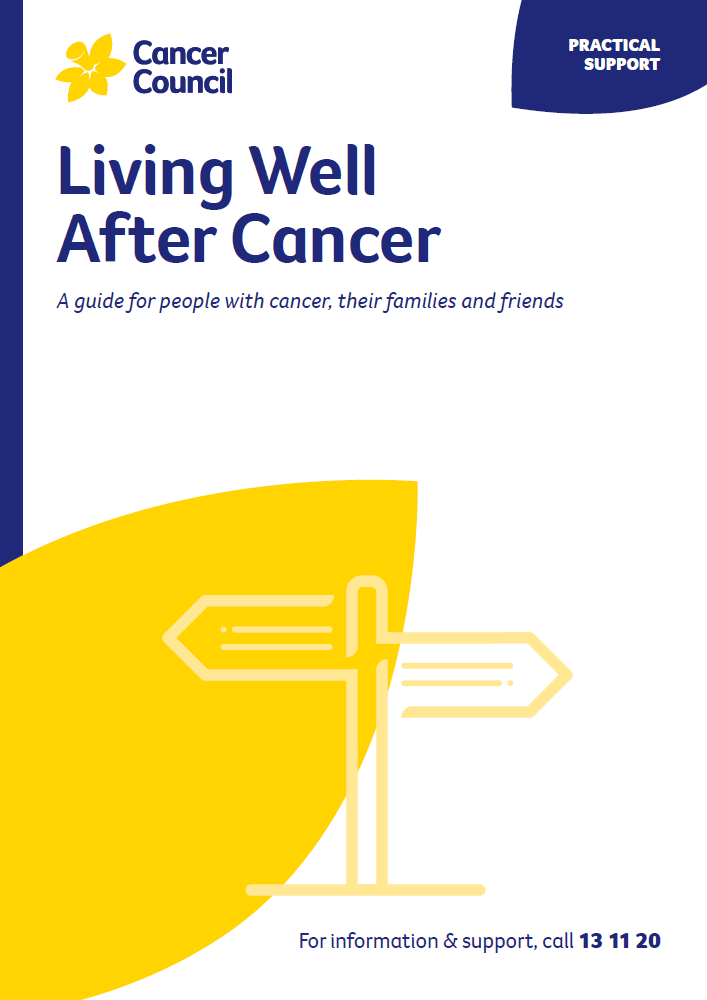- Home
- Primary bone cancer
- Life after treatment
Life after treatment
For most people, the cancer experience doesn’t end on the last day of treatment. Life after treatment for primary bone cancer has its own challenges. You may have mixed feelings when treatment ends, and worry that every ache and pain means the cancer is coming back.
Learn more about:
- Overview
- Coping with primary bone cancer
- Follow-up appointments
- Joining a clinical trial
- If the cancer returns
Overview
Some people say that they feel pressure to return to ‘normal life’, but they don’t want life to return to how it was before cancer. Take some time to adjust to the physical and emotional changes, and re-establish a new daily routine at your own pace.
Cancer Council 13 11 20 can help you connect with other people who have had cancer, and provide you with information about the emotional and practical aspects of living well after cancer.
Coping with primary bone cancer
Being diagnosed with a rare cancer can be frightening. The physical changes after treatment for bone cancer can affect how you feel about yourself (self-esteem) and make you feel self-conscious. It will take time to get used to the differences in how you look and what you can do.
Limb-sparing surgery is a major operation that can leave a scar and make the skin feel tight. If you have an amputation or a lot of bone is removed, you may feel grief and loss. Many people find it helps to talk to a counsellor, psychologist, friend or family member. Ask your treating team or call Cancer Council 13 11 20 to find out about support services in your area.
For more information, see Emotions and cancer and Rare and Less Common Cancers.
Follow-up appointments
After treatment, you will need regular check-ups for several years to confirm that the cancer hasn’t come back and to help you manage any treatment side effects.
How often you will need to see your doctor will vary depending on the type of bone cancer. Check-ups will become less frequent if you have no further problems. Let your doctor know immediately of any health concerns between appointments.
Should I join a clinical trial?
Your doctor or nurse may suggest you take part in a clinical trial. Doctors run clinical trials to test new or modified treatments and ways of diagnosing disease to see if they are better than current methods.
For example, if you join a randomised trial for a new treatment, you will be chosen at random to receive either the best existing treatment or the modified new treatment. Over the years, trials have improved treatments and led to better outcomes for people diagnosed with cancer.
You may find it helpful to talk to your specialist, clinical trials nurse or GP, or to get a second opinion. If you decide to take part in a clinical trial, you can withdraw at any time.
For more information, see Clinical trials and research. To find current clinical trials near you, visit Cancer Institute NSW or Australian Cancer Trials.
If the cancer returns?
For some people, bone cancer does come back (recur) after treatment. The risk that bone cancer will recur is greater within the first 3 years after treatment has finished. Treatment options may include surgery, chemotherapy and radiation therapy.
In some cases of advanced primary bone cancer, treatment will focus on managing your symptoms and improving your quality of life without trying to cure the disease. Palliative treatment can relieve pain and help to manage other symptoms.
Watch this video to see why eating well is so important after a cancer diagnosis, and what you can do to maintain a healthy diet.
Research shows that exercise benefits people with cancer during and after treatment. Find out more in this video or see our other exercise videos.
More resources
Prof Peter Choong AO, Orthopaedic Surgeon, and Sir Hugh Devine Professor, St Vincent’s Hospital, and Head of Department of Surgery, The University of Melbourne, VIC; Catherine Chapman, Adolescent and Young Adult and Sarcoma Cancer Specialist Nurse, Division of Cancer and Ambulatory Support, Canberra Hospital, ACT; A/Prof Paul Craft AM, Medical Oncologist, Canberra Hospital and Australian National University, ACT; Belinda Fowlie, Bone Tumour Nurse Practitioner Candidate, SA Bone and Soft Tissue Tumour Unit, Flinders Medical Centre, SA; Prof Angela Hong, Radiation Oncologist, Chris O’Brien Lifehouse, and Clinical Professor, The University of Sydney, NSW; Vicki Moss, Nurse Practitioner, SA Bone and Soft Tissue Tumour Unit, Flinders Medical Centre, SA; A/Prof and Dr Marianne Phillips, Paediatric and Adolescent Oncologist and Palliative Care Physician, Perth Children’s Hospital, WA; Chris Sibthorpe, 13 11 20 Consultant, Cancer Council Queensland; Stephanie Webster, Consumer.
View the Cancer Council NSW editorial policy.
View all publications or call 13 11 20 for free printed copies.

